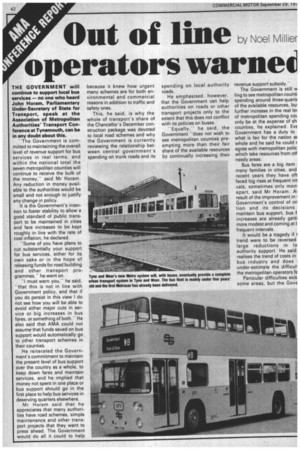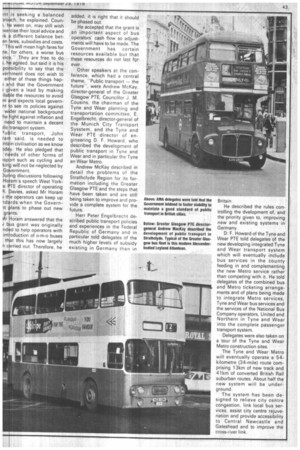Out of line by \oel Miller
Page 44

Page 45

If you've noticed an error in this article please click here to report it so we can fix it.
operators warn&
THE GOVERNMENT will continue to support local bus services — no one who heard John Horam, Parliamentary Under-Secretary of State for Transport, speak at the Association of Metropolitan Authorities Transport Conference at Tynemouth, can be in any doubt about this.
The Government is committed to maintaining the overall level of revenue support for bus services in real terms, and within the national total the seven metropolitan counties will continue to receive the bulk of the money," said Mr Horam. Any reduction in money available to the authorities would be small and not enough to justify any change in policy.
It is the Government's intention to foster stability to allow a good standard of public transport to be maintained in cities and fare increases to be kept roughly in line with the rate of cost inflation, he declared.
-Some of you have plans to cut substantially your support for bus services, either for its own sake or in the hope of releasing funds for road building and other transport programmes,he went on.
"I must warn you," he said, "'that this is not in line with Government policy, and that if you do persist in this view I do not see how you will be able to avoid either major cuts in service or big increases in bus fares, or something of both.He also said that AMA could not assume that funds saved on bus support would automatically go to other transport schemes in their counties.
He reiterated the Government's commitment to maintain the present level of bus support over the country as a whole, to keep down fares and maintain services, and he implied that money not spent in one place or bus support should go in the first place to help bus services in deserving quarters elsewhere.
Mr Horam said that he appreciates that many authorities have road schemes, simple maintenance and other transport projects that they want to press ahead. The Government would do all it could to help because it knew how urgent many schemes are for both environmental and commercial reasons in addition to traffic and safety ones.
This, he said, is why the whole of transport's share of the Chancellor's December construction package was devoted to local road schemes and why the Government is currently reviewing the relationship between central government's spending on trunk roads and its spending on local authority roads.
He emphasised. however, that the Government can help authorities on roads or other transport projects only to the extent that this does not conflict with its policies on buses.
"'Equally," he said, the Government -does not wish to see metropolitan counties preempting more than their fair share of the available resources by continually increasing their
revenue support subsidy."
The Government is still \A ling to see metropolitan counti spending around three-quartE of the available resources, bu• further increase in the real le\ of metropolitan spending cot only be at the expense of sh counties, he explained. EVE Government has a duty to what is fair for the nation w whole and he said he could r agree with metropolitan polic which take resources from off needy areas.
Bus fares are a big item many families in cities, and recent years they have oft faced big rises at frequent int vals, sometimes only mon• apart, said Mr Horam. result of the improvement in • Government's control of ini tion and its decisions maintain bus support, bus f increases are already getti more modest and coming at I frequent intervals.
It would be a tragedy if I trend were to be reversed large reductions in lo authority support. He said realises the trend of costs in bus industry and does I under-estimate the difficul• the metropolitan operators fE Particular difficulties exis some areas, but the GOVE
,nt is seeking a balanced )ro ch, he explained. Coun; e went on, may still wish xe cise their local advice and !l< different balance beten ares, subsidies and costs. 'T is will mean high fares for ne, for others, a worse bus
vic They are free to do ;, h agreed, but said it is his po sibility to say that the ver ment does not wish to ei her of these things hap) a d that the Government ; g ven a lead by making ila le the resources to avoid m nd expects local governnt o see its policies against w der national background he ight against inflation and n ed to maintain a decent )lic transport system.
U ilic transport, John ra said, is needed to nt n civilisation as we know Dd y. He also pledged that n eds of other forms of sp.rt such as cycling and king will not be neglected by G ernment.
)ur ng discussions following Ho am's speech West Yorke TE director of operating R. lavies, asked Mr Horam t e operators can keep up id rds when the Govern it to phase out new gr nts.
oram answered that the s grant was originally nd d to help operators with int oduction of o-m-o buses t at this has now largely c rried out. Therefore, he added, it is right that it should be phased out.
He accepted that the grant is an important aspect of bus operators' cash flow so adjustments will have to be made. The Government has certain resources available but that these resources do not last for ever.
Other speakers at the conference, which had a central theme, "'Public transport — the future", were Andrew McKay, director-general of the Greater Glasgow PTE, Councillor J. M. Cousins, the chairman of the Tyne and Wear planning and transportation committee, E. Engelbrecht, director-general of the Munich City Transport Sysstem, and the Tyne and Wear PTE director of engineering D. F. Howard. who described the development of public transport in Tyne and Wear and in particular the Tyne an Wear Metro.
Andrew McKay described in detail the problems of the Strathclyde Region for its formation including the Greater Glasgow PTE and the steps that have been taken and are still being taken to improve and provide a complete system for the future.
Herr Peter Engelbrecht described public transport policies and experiences in the Federal Republic of Germany and in particular told delegates of the much higher levels of subsidy existing in Germany than in Britain.
He described the rules controlling the dvelopment of, and the priority given to, improving new and existing systems in Germany.
D. F. Howard of the Tyne and Wear PTE told delegates of the new developing integrated Tyne and Wear transport system which will eventually include bus services in the county feeding in and complementing the new Metro service rather than competing with it. He told delegates of the combined bus and Metro ticketing arrangements and of plans being made to integrate Metro services, Tyne and Wear bus services and the services of the National Bus Company operators, United and Northern in Tyne and Wear into the complete passenger transport system.
Delegates were also taken on a tour of the Tyne and Wear Metro construction sites.
The Tyne and Wear Metro will eventually operate a 54kilometre (34-mile) route comprising 13km of new track and 41km of converted British Rail suburban routes. About half the new system will be underground.
The system has been designed to relieve city centre congestion, link local bus services, assist city centre rejuvenation and provide accessibility to Central Newcastle and Gateshead and to improve the cross-river link.
























































































































